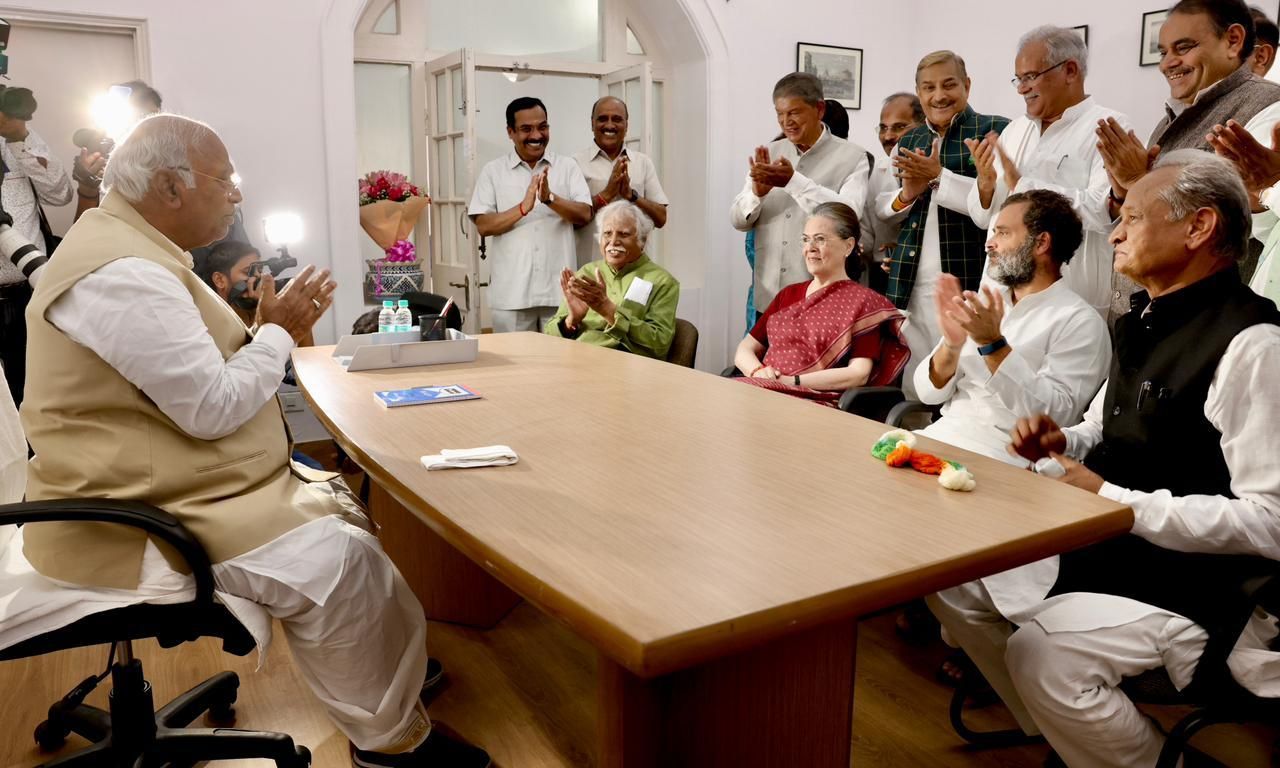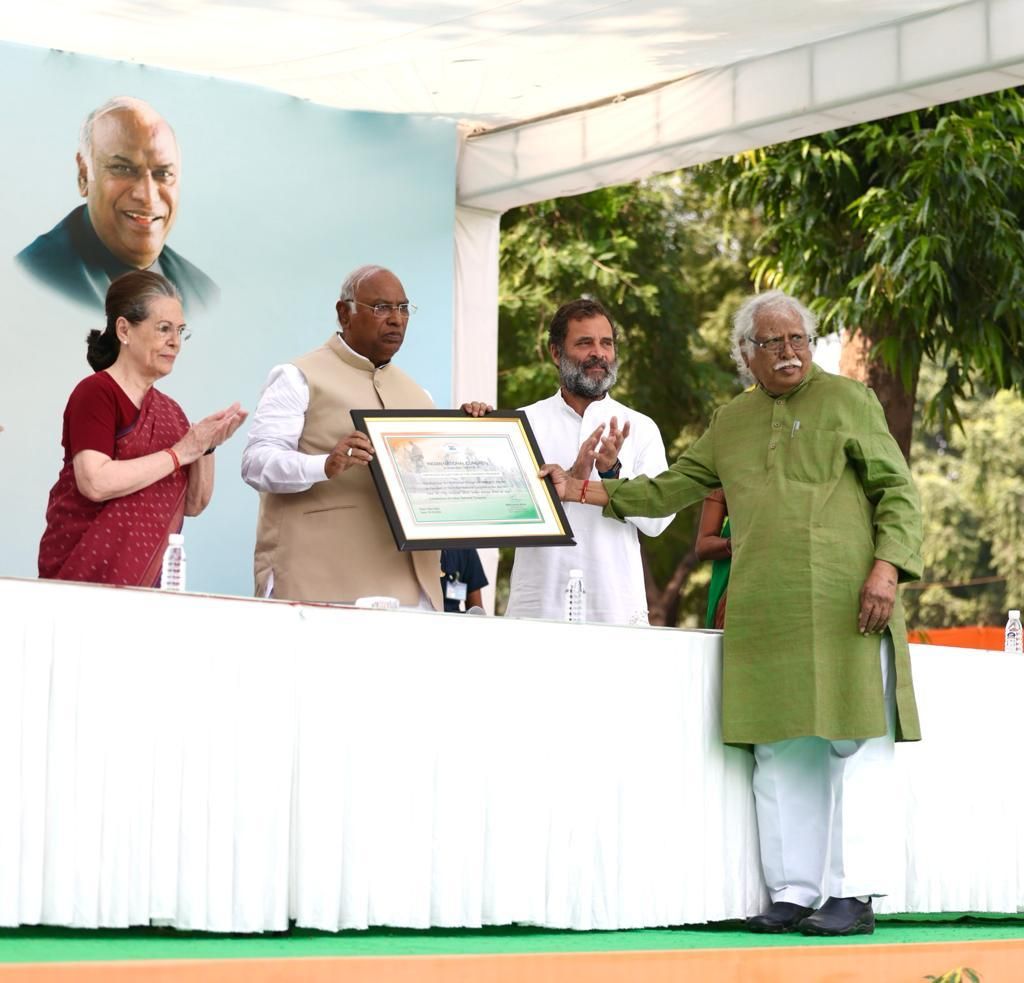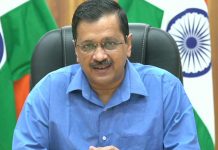
The biggest challenge for new Congress president Kharge will be proving to all, in the party and outside, that he is not a ‘yes man’ of the Gandhis and that he can take independent decisions for the good of the party
So, at long last, after 24 years to be precise, the Grand Old Party has a non-Gandhi as its president. Veteran Congress leader Mallikarjun Kharge, who pipped rebel leader Shashi Tharoor in a keenly-watched and widely publicized election, was sworn in on October 26 as the party chief. It was a one-sided contest from the beginning, with the odds heavily loaded against the suave Tharoor and no one was surprised at the outcome. The down-to-earth Kharge, who incidentally has the formidable reputation of almost never having lost an election, earning him the sobriquet of ‘Solillada Sardara’ (someone who does not know defeat), was obviously more acceptable to the Congressmen who come from diverse backgrounds and from all parts of the country, than the anglicised, polished and urbane Tharoor.
However, full marks to Tharoor for showing to the world that inner party democracy was well and alive in the Congress and also to the High Command for staying neutral in public, whatever their personal choices might have been. Even though he lost, the party would do well to give Tharoor an important role in the organization. Because he can bring in fresh ideas and his vast international experience to put his weight behind Kharge and steer the party towards its regeneration and make it more relevant and attractive for the coming generation of Indians too, while Kharge deals with the many tasks that await him as party chief.
The new Congress chief will have to hit the ground running because the 2024 general elections will be upon us before we even know it and Kharge has a mountain-load of work to do and challenges to meet because the party has over the years lost a lot of its political relevance and resonance with the masses.
Thankfully, Kharge has taken over at a time when the ‘Bharat Jodo Yatra’ has revived the people’s interest in the Congress and the party cadre is enthused. At least in the South, there has been a major revival and emotional connect, but then, South India has always been the playground of the Congress. After the ‘Bharat Jodo Yatra’ passes through Telangana, the Yatra will continue in Maharashtra, Odisha, Assam, West Bengal, Madhya Pradesh, Uttar Pradesh and end in Kashmir by February. How they fare when the Yatra goes into this phase only time will tell. But one thing is for sure, its progress will be watched keenly by friends and political opponents alike if the new “trend” of yatras that Rahul Gandhi has sparked is anything to go by.
That said, if the 80-year-old Kharge has to steer the party towards the 2024 Lok Sabha elections in any sort of decent fighting form, he has to put the Congress’ house in order first. And that is a huge challenge because like any old organization, the 137-year-old party comes with its unique set of problems and baggage.

First and foremost, Kharge has to clamp down on the infighting in the party with an iron hand, and stop senior leaders from fighting wars in the full media glare. A case in point being the happenings soon after the party president’s election took place. The Congress election in-charge Madhusudan Mistry lambasted Tharoor and called him “two-faced.” It took away the feel-good factor that the democratic exercise of choosing a non-Gandhi president had created in the minds of the people and threw up a picture of a highly divided party with bitter quibbling among senior leaders.
Second, Kharge would do well to sit down with whatever leaders are left from the original G-23 and listen to their gripes and criticism. After all, criticism coming from people who have given their whole careers to a single party and are die-hard Congressmen cannot be all negative or vested. There must be something constructive and true in it too. So, in order to go forward the party must learn from its mistakes of the past and for this, it has to give a patient and serious hearing to those who have its best interests at heart.
This exercise, in turn, might stem the exodus of veteran Congressmen, who left because they were feeling suffocated and unappreciated due to the atmosphere of sycophancy that prevails in the Congress and due to the inability of the High Command to make them feel valued and appreciated. It might soothe the hurt egos over the indifference shown to their genuine concerns about issues that mattered to them and stop them going over to other parties that are more than willing to poach them. Keeping the flock together at this time is one of Kharge’s key tasks, so he has to be accessible to the leaders and workers alike.
Taking a few pages out of political strategist Prashant Kishor’s famed presentation to the Congress will also stand the Grand Old Party in good stead, because the man obviously knows a thing or two about politics and winning elections, going by his track record of delivering wins to many a grateful party.
Apart from the South, it is also imperative for Kharge to create a niche for himself and the Congress in the Hindi heartland because all roads to the Centre lead through there. The Grand Old Party has been unable to make an impact in the key States of Uttar Pradesh and Bihar that account for 120 Lok Sabha seats and has performed miserably at the hustings, being unable to touch even the double digit mark. This is an alarming state of affairs as UP is being handled by Priyanka Gandhi Vadra herself and the party losing its grip there is in effect the failure of the leadership to translate the goodwill that the Congress used to enjoy in the State and in the family pocket boroughs into votes. How Kharge revives the Congress in UP without stepping on Priyanka’s toes remains to be seen, but it will be a major exercise in diplomacy for sure.
Of all the challenges of leading the party, the biggest one for Kharge will be proving to all, in the Congress and outside, that he is not a “yes man” of the Gandhi family and that he can take independent and tough decisions for the good of the Congress.
Obviously, given the loyalty to the Gandhis in the party he will have to strike a fine balance because while he cannot be seen as a rubber stamp president who is subservient to the Gandhis, he also cannot be perceived as a challenge to their authority. Thankfully, his authority has already been given a big boost in the eyes of the Congressmen by Rahul Gandhi saying openly during his brief interaction with media in the midst of the Bharat Jodo Yatra in Adoni that the new Congress president would decide on “what my role (will be) and how I will be deployed”. “Obviously”, Rahul replied when asked if he would be reporting to the new president. “President is the supreme authority in the Congress and everyone reports to him. My role… I am very clear… Congress president will decide what my role is and how I will be deployed,” he had remarked. Even though, everyone knows that Rahul will continue to call the shots to a large extent in the party, but this was a message for the rank-and-file and for the Opposition too.
Plus, Sonia will play the role of a mentor and continue to be the chairperson of the Congress Parliamentary Party (CPP). How much room Kharge will get to manoeuvre in such a scenario, remains to be seen because of the Congress culture of looking towards the Gandhis for guidance. Whatever Kharge does, he can be sure each move that he makes will be scrutinized, particularly by the Opposition which had all through the campaign for the party president polls labeled the veteran Dalit leader as the “official” candidate of the Gandhis. Now it is up to him to prove that he can be his own man and lead the party through a series of challenges that it is currently facing.
Kharge also has the unenviable task of resolving the Rajasthan imbroglio which saw Chief Minister Ashok Gehlot “retiring hurt” from the presidential race. It will take all of Kharge’s political acumen to ensure that the ego clash between the two leaders from different generations does not hurt the party in the Assembly elections next year. He has to placate Gehlot and at the same time ensure that the ambitious and keen Sachin Pilot finds his rightful place. He has to exploit the strengths of both these leaders to ensure that the party emerges a winner in the end. How and if he can do this, remains to be seen.
But the desertions in the Congress party will only stop if Kharge creates a win-win situation for both the generations of leaders, especially the ‘Young Turks’ and the ‘Old Guard’ whose rivalry within the party is legendary. The ‘Old Guard’ doesn’t want any changes that challenge their supremacy and hold over the party and are unwilling to let the restless ‘Young Turks’ get a toehold on their turf. Now, Kharge will have to manage both sides and create a balance so that the party works as a cohesive unit. The ‘Young Turks’ will lead the people and workers in the future and Kharge has to prepare them for the role while ensuring that the ‘Old Guard’, too, doesn’t get sidelined. It’s a tightrope walk but his victory speech in this regard was very promising as he made it clear that “no one is small or big and we all have to work like karyakartas (workers) to strengthen the organization.” This is exactly what is needed, “working like a team.”
He has vowed to implement the ‘Udaipur Declaration’ which holds the promise of reserving 50 per cent of party posts for those below 50 years of age and allotting 50 per cent of seats in the 2024 Lok Sabha elections to them too. He has to deliver on this promise and also hold the election to the Congress Working Committee, nominate his team and constitute the Parliamentary Board. He owes this to the G-23 who supported him in this election to the party’s top post instead of Tharoor, who was one of the “rebels.”
The fact remains that the 2024 elections are round the corner and Kharge needs to set up an effective election machinery to challenge rival parties, if the Congress has to make any sort of comeback. The party would be well-advised to consider the looming Assembly polls in Gujarat and Himachal Pradesh as a testing ground and play the game the best it can. Kharge has to devise a new strategy which will resonate with the workers, get the votes and counter its rival parties to deliver a convincing victory. And all this has to be done within a very short time. Solillada Sardara Kharge has his task cut out for him.













